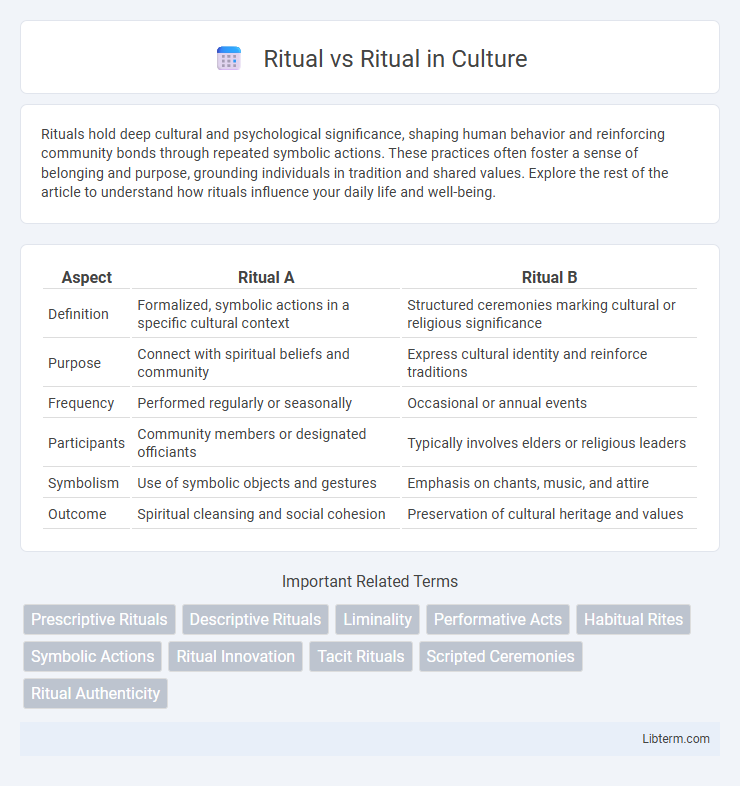Rituals hold deep cultural and psychological significance, shaping human behavior and reinforcing community bonds through repeated symbolic actions. These practices often foster a sense of belonging and purpose, grounding individuals in tradition and shared values. Explore the rest of the article to understand how rituals influence your daily life and well-being.
Table of Comparison
| Aspect | Ritual A | Ritual B |
|---|---|---|
| Definition | Formalized, symbolic actions in a specific cultural context | Structured ceremonies marking cultural or religious significance |
| Purpose | Connect with spiritual beliefs and community | Express cultural identity and reinforce traditions |
| Frequency | Performed regularly or seasonally | Occasional or annual events |
| Participants | Community members or designated officiants | Typically involves elders or religious leaders |
| Symbolism | Use of symbolic objects and gestures | Emphasis on chants, music, and attire |
| Outcome | Spiritual cleansing and social cohesion | Preservation of cultural heritage and values |
Defining Ritual: Traditional vs. Contemporary Interpretations
Rituals traditionally encompass structured ceremonies rooted in cultural, religious, or social practices, often marked by symbolic actions and prescribed sequences. Contemporary interpretations of ritual expand this definition to include personalized and secular activities that foster meaning, connection, and mindfulness in modern life. Understanding the divergence between traditional and contemporary rituals highlights their evolving role in identity formation and community engagement.
Ritual vs Ritual: Unpacking the Terminology
Ritual vs Ritual highlights the importance of distinguishing between culturally embedded practices and personal routines that both fall under the term "ritual." Anthropologists define ritual as a formalized, symbolic action often tied to religious or cultural traditions, while psychologists may interpret rituals as habitual behaviors that provide psychological comfort or structure in daily life. Understanding these nuanced definitions helps clarify the complex role rituals play in shaping human behavior, identity, and social cohesion.
Historical Roots: How Rituals Diverge Across Cultures
Rituals, deeply embedded in diverse cultures, originate from unique historical contexts that shape their distinct practices and meanings. Indigenous ceremonies in Africa often emphasize ancestral communion and natural cycles, contrasting with East Asian rituals rooted in Confucian principles and ancestor veneration. These divergent historical roots illustrate how rituals function as cultural expressions that reinforce community identity and transmit values specific to their societies.
Symbolism and Purpose: Why Rituals Matter
Rituals serve as powerful symbolic actions that connect individuals and communities to deeper meanings, often reflecting cultural, spiritual, or social values. Symbolism in rituals conveys complex ideas through gestures, objects, or words, reinforcing shared identity and collective memory. The purpose of rituals lies in fostering belonging, marking transitions, and providing a sense of order, making them essential for human cohesion and emotional well-being.
Social Functions: Connecting Communities through Rituals
Rituals serve as powerful social functions by fostering community cohesion and shared identity, enabling individuals to connect through collective practices and symbols. Ceremonies like weddings, religious rites, and festivals reinforce social bonds and cultural continuity by creating a sense of belonging and mutual understanding. These communal rituals facilitate communication across generations and social groups, strengthening the fabric of society through repeated, meaningful interactions.
Personal vs Collective Rituals: Individual and Group Dynamics
Personal rituals often involve individualized practices that foster self-reflection, emotional regulation, and a sense of identity, emphasizing internal dynamics and personal meaning. Collective rituals engage groups through shared symbols, coordinated actions, and communal participation, strengthening social bonds, cultural identity, and group cohesion. Understanding the distinctions between personal and collective rituals reveals how individual experiences influence group dynamics and how communal ceremonies shape personal beliefs.
Sacred and Secular Rituals: Blurring the Boundaries
Sacred and secular rituals often intertwine, blurring the boundaries as both serve to reinforce communal identity and cultural continuity. Sacred rituals, anchored in religious or spiritual significance, invoke transcendence and divine connection, while secular rituals operate through social traditions and collective memory. The convergence of these rituals highlights the fluidity of meaning and the shared human need for symbolic practice across diverse contexts.
Repetition and Transformation: The Evolution of Rituals
Rituals are defined by repetition, where recurring actions reinforce cultural values and social cohesion. Over time, rituals undergo transformation, adapting to contemporary contexts while preserving their core symbolic meanings. This evolution highlights the dynamic nature of rituals as both tradition and innovation in human societies.
Controversies: When Rituals Clash
When rituals clash, controversies often arise due to conflicting cultural values and spiritual beliefs, leading to misunderstandings or tensions within communities. Disputes may center around the legitimacy, appropriation, or alteration of sacred practices, highlighting the struggle to balance tradition with modernity. Resolving these conflicts requires sensitive dialogue that respects diverse perspectives while acknowledging the deep symbolic significance of each ritual.
The Future of Ritual: Adapting in a Changing World
The future of ritual centers on evolving traditional practices to resonate within modern societal contexts, emphasizing digital integration and personalized experiences. Emerging technologies, such as virtual reality and AI, facilitate immersive and accessible rituals, breaking geographical and cultural barriers. This adaptation ensures rituals remain relevant, fostering community connection and individual meaning in a rapidly changing world.
Ritual Infographic

 libterm.com
libterm.com